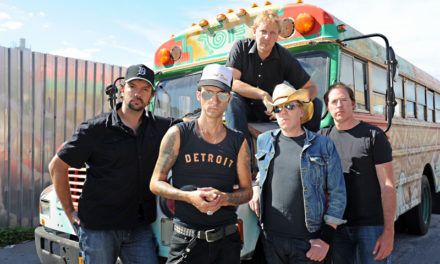The chasm in the music industry is growing. On one side are the companies that control it and on the other are artists trying to survive. There was once a time in the not too distant past where artists made money from simply releasing music. As Spotify and Apple Music morphed that into a system where artists receive fractions of pennies, or in Spotify’s case sometimes nothing at all, the focus shifted to touring. For a majority of musicians, their financial tour goal nowadays is to break even.
In 2025, the number of artists filling arenas and making a living wage from streaming is on the decline, and it isn’t only them. Fans feel it too. Ticket prices continue to rise while the monopoly that controls those prices increases its valuation and gets more creative in how they extract more money through dynamic pricing and cornering the resale market. All while simultaneously stating publicly that fans are not paying enough.
Spend any time following your favorite artist online and none of the above is news. In times like these, it’s easy to lose hope as the needle pushes further into the bubble, testing its tension. Any moment the entire thing could pop, if it hasn’t already.
What if going to a quaint “cafe” on a Thursday evening, for a measly $12 (after fees) and free parking, helped fix it? What if that cost included a concert featuring an artist who has toured the world and plays a style of shoegaze, combined with a little dream pop, that takes control of your ear canals?
One Night Live is banking on fans doing that exact thing on November 13 at Rumba Cafe, to see Kid Tigrrr.
Inside One Night Live are three organizations: Live Music Society, D Tour and Clevelandrock: Past, Present, Future (Cleveland PPF). Jenna Fournier, the artist behind Kid Tigrrr, came out of the Cleveland PPF incubator program.
That incubator program vets the applications of local artists and selects a few to join each year. Each artist is assigned an industry contact who assists in everything from planning a tour, concert posters and the other small pieces of getting music out into the world all the way to the most important work of creating the music. Cleveland PPF also gives the artist a $2,000 loan at one percent interest ($20). That money goes towards creating music, releasing music, making merch and anything else needed in the process of making art a livelihood.
Cleveland PPF is one of only three incubator programs in the country, and they do not take first time musicians just getting started. It looks for people who are already on their way to becoming a full-time musician, and Fournier more than fits that definition.
Fournier, a Cleveland native is also the front person of Niights. In Niights, Fournier traveled Europe and Japan at a time when the shoegaze revival was still simmering in the United States. Stateside, Fournier recently played bass for Smashing Pumpkins frontman Billy Corgan’s Machines of God side project. So, she is not unfamiliar with the big stage.
For years, Fournier was not allowed to release her solo work due to record label restrictions. In 2024, Fournier was finally allowed to write, record and release her self-produced debut LP “Stoned + Animald.”
“After a decade or so of making studio albums, I just sort of felt like, for one, I needed to learn the language of the production side and the recording side and the audio engineering side of things,” Fournier told Columbus Calling. “Even just learning the language would help me talk to a producer to communicate what I wanted, because I would get frustrated when I just I didn’t like what I was hearing, but I didn’t know how to articulate it.”
Through the support of Cleveland PPF, Fournier’s release is a journey through her musicianship and production self-discovery, put into 11 tracks that is the perfect album to sit back, turn on and become immersed.
While Fournier looked to bedroom pop artists’ work like Elvis Depressedly and Grouper as motivation to go the DIY route, the album itself shows that the line between at-home recording and record label-backed studio recording is blurred. It does not come across as a grainy, local, recording because of the leg work Fournier put into growing her knowledge of music production.
“I wasn’t as much intimidated as it was a huge learning curve, and it was frustrating,” said Fournier. “There’s a lot of free resources online, but you have to sift through the YouTube guys that are, ‘hey, like and subscribe. Here’s my entire backstory before I tell you how to do the one trick that you’re looking for,’ right?”
The final product shows that the perseverance was worth it.
Cindy Barber, the founder of Cleveland PPF, owner of the Beachland Ballroom and longtime supporter of the Cleveland music scene, worked to have Fournier set out on the One Live Tour, only the second in the projects history. Barber won awards for her work and did similar work to the One Night Live tour early in the 2000s at Beachland Ballroom with The Black Keys, before they became a mainstay in rock music.
For Fournier, this tour is her first for the 2024 release and as a solo leading artist.
The tour is 11 nights in 11 cities across the East Coast that began Wednesday in Washington D.C. and ends on the 16th in Detroit, Michigan.
For Columbus, Fournier has history playing the city with Niights at Ace of Cups and Spacebar, but Nov. 13 is the first time at Rumba Cafe, which is part of NIVA, the National Independent Venue Association.
That is where the D Tour organization comes into the tour. D Tour is building a venue map of independent rooms across the country. When considering locations in Columbus, Rumba stood out and will host the one-of-a-kind tour setup.
It is a tough ask to get folks out to a show for an artist that they don’t know, and One Night Live may get more attention with a headlining artist who plays bigger, corporate, venues, but that is not the reason this tour exists. This tour was created to propel artists and help them stay in the arts.
“Jen is, in some ways, an unknown quantity to some of these cities, so trying to get people out to see her work, which is inspiring to have a woman doing these really technical, loopy guitar things and with pedals and her ethereal voice,” Barber told Columbus Calling. “I mean, to me, if you go to the show, you’re going to go, ‘Oh, that is so fresh and unique,’ but we have to get people in the room.”
That would not happen without the partnership with One Night Live. Live Music Society, based out of New York, provides a stipend to the venues of $300. They use that to bring in a sound person and market the event.
“Live Music Society feels like providing funding for the venues will keep these small venues, these venues that are giving breaks to new artists alive,” Barber told Columbus Calling.
On top of the venue receiving money, each opening artist receives $50 to put towards social media marketing for the show. In Columbus, that’s local indie artist Coralilly. Setting Coralilly up with a small amount of money to spread the word is another way the project is trying different ways to get the word out there for up and coming musicians like Fournier.
This quick 11-night tour is only the beginning for Fournier and One Night Live. There are already plans for a West Coast tour for Kid Tigrrr next year. Also, Barber and Fournier are headed to the Folk Alliance International conference in New Orleans in January to share the results of the tour.
With all the talk of money handed to venues and artists, the tour might read like a case of charity, but it is not. One Night Live is taking tangible steps to find a new way to support artists and get music into the ears of cities at venues that also need the help.
Anyone who sees Kid Tigrrr at Rumba Cafe next Thursday will walk away with an affordable night of music from a tried and tested artist who shares their wonderful creation. It has the makings of a show that when you walk back to your car, you tell yourself you would have paid more for it. While two hours away in Cleveland may sometimes feel like forever away, when the music scenes of Columbus, Cleveland, Pittsburgh and Detroit combine, it makes a larger web of venues to help lift up talented artists across the midwest.
Barber knows all about that as a 25-year venue owner.
“I get to see a lot of national artists coming through. And to me, I would hold our group of local musicians up against half of the national touring musicians as equal or better musicians,” said Barber.
Fournier is within those ranks. Think of One Night Live as performing the work that record labels used to do, without the chains that sometimes come with that relationship.
“They’re taking over some of the burden of the booking and the marketing and the promoting side of things as well. So they’re helping me in that way,” said Fournier. “But there’s an emotional benefit of seeing that. There’s people who care, there’s people that value what indie artists do, because between AI and streaming platforms and the current climate, I think a lot of indie artists just feel really devalued right now. One Night Live is saying ‘no, we see you and we think your voice matters, and we’re going to do something about it.’”





